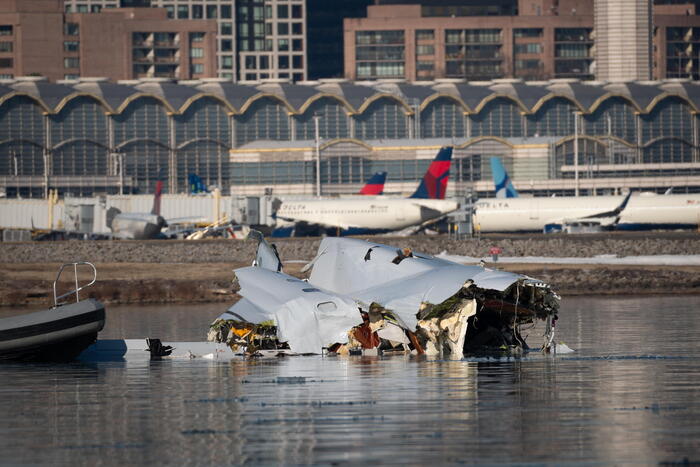Reuters reports that the Federal Aviation Administration is planning to reduce the number of flights arriving at Ronald Reagan International Airport in Washington D.C. in order to address safety concerns. The decision comes after a regional jet collided with an Army Black Hawk helicopter shortly before landing on January 29th, killing 67 people and leaving no survivors on either aircraft. The crash was the worst accident of its kind in the United States in over two decades. An email obtained by the news outlet from the FAA to airlines states that landings will be reduced from 28 per hour to 26, which is estimated to increase wait times from 40 minutes to 50. The federal agency stated that these changes “will reduce risk and allow a little space for extra coordination.”
It is unclear what exactly led to last week’s accident, as the National Transportation Safety Board’s investigation is still ongoing. An FAA report first revealed by the New York Times shortly after the crash said that the air traffic control staffing during the incident was “not normal for the time of day or volume of traffic,” and that a single air traffic controller was coordinating with both helicopters and planes in the area, essentially doing the job of two people. Since the crash, helicopter flights in the area have been restricted and two of the lesser-used runways at Ronald Reagan International have been closed.
Speaking at the National Prayer Breakfast in Washington, President Trump signaled his intent to institute broad upgrades to the air traffic control system. “I think what is going to happen is we’re all going to sit down and do a great computerized system for our control towers,” Trump said. “Brand new — not pieced together, obsolete.” In a statement on X, Transportation Secretary Sean Duffy stated on Wednesday that Musk and his DOGE surrogates were going to “plug in to help upgrade our aviation system,” with Musk adding in his own post later, that they will institute “rapid safety upgrades to the air traffic control system.” Over the years, Elon Musk has publicly feuded with the FAA over their regulation of his rocket company, SpaceX, calling for the resignation of then-administrator of the agency Michael Whitaker last fall.
Through an act of Congress in 2003, the FAA has been working on an upgraded air traffic control system called NextGen, which employs a safer and more efficient system that uses satellite technology. The system is in place at some airports, but remains unused across most of the country.












